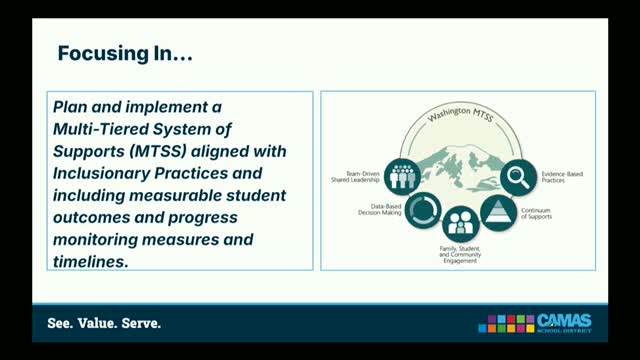Camas board workshop drills down on theories of action and MTSS to boost student learning
Get AI-powered insights, summaries, and transcripts
Subscribe
Summary
At its Nov. 10 workshop the Camas School District board heard administrators tie the district strategic plan and 'profile of a graduate' to classroom practice through school-level theories of action and a multi‑tiered system of supports, with a particular focus on literacy in elementary grades and ninth‑grade on‑track interventions in secondary.
At a Nov. 10 board workshop, district leaders outlined how school‑level "theories of action" and a multi‑tiered system of supports (MTSS) are being used to translate the Camas School District strategic plan into classroom practice.
Speaker 2, the district presenter, said the MTSS vision is that "learners get the academic behavior and social emotional support they need when they need it to promote meaningful learning for all," and described school cycles of inquiry as the vehicle for that work.
District leaders told the board they asked principals to narrow the district’s profile of a graduate to two specific traits this year so goals would be actionable at the building level. For elementary schools the stated theory of action focuses on MTSS for literacy — emphasizing tier‑1, evidence‑based strategies for word recognition and language comprehension so students can access grade‑level content. For secondary schools the plan centers on strengthening universal instruction, providing timely interventions and aligning systems to support sixth‑to‑ninth‑grade students so more ninth‑grade students earn core credits and stay on track to graduate.
Presenters stressed the role of school leadership and data. Speaker 2 described a weekly review of student results at CCA and said the practice aims to identify whether a student’s difficulty is attendance, lack of quiz performance, or not turning in work — each of which requires a different support strategy. "When we know the students and what they each need, place to support students into success," the presenter said when summarizing what boards should carry away from the workshop.
The board also heard that principals were asked to set personal or professional goals tied to the two priority traits so the strategies would "articulate all the way down the system to the classroom." Speakers noted that some interventions will be "messy," and members encouraged visiting intervention periods during site visits to observe small‑group work and emerging practices.
Leaders tied some of the work to funding and professional development: the district said it expects to align certain activities with Title II funds and to use progress‑monitoring data to guide targeted professional learning around engagement and intervention practices.
Next steps: board members will rotate through short school presentations the night of the workshop and write brief feedback cards for each presenting school. The board returns to regular business at future meetings and will follow through on site visits in December to see the interventions in practice.
